Nov 2007
Nov 2007 sadminA CAREER IN THE DEFENCE FORCE
A CAREER IN THE DEFENCE FORCE sadminThe South African National Defence Force (SANDF) is looking for young, healthy and eager young men and women to join their ranks. The process of increasing its staff with over 7 000 young people from next year has already started. Recruitment has started and the closing date for applications is April next year.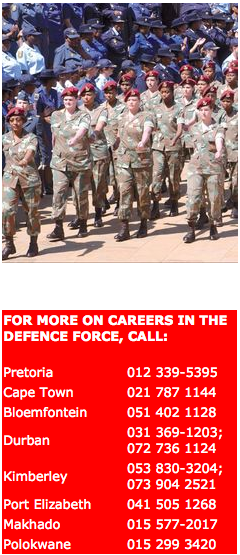
Selection
Because selection of applicants is a very long process, successful applicants will only join the Defence Force in 2009. The main reason why it takes so long is that hundreds of applications are received. All of them have to be checked carefully to see if all the information is correct. For example, those with criminal records are excluded.
So if you apply, be prepared to wait for at least a few months before you receive any feedback.
Career paths
Young men and women who are interested in joining the SANDF don’t have to be become soldiers. There are many different career paths in all the branches of the defence force. These include the South African Army, Navy, Air Force and Military Health Services.
If you want to join, you must be healthy and disciplined and be between 18 and 22 years old. You must also have a matric certificate with at least a D symbol at higher grade or a C symbol at standard grade. Candidates who have mathematics, geography and biology will get preference.
JIPSA
Careers in the Defence Force are not only available to matriculants, but also to university or college graduates who have diplomas or degrees. The Defence Force needs people who are qualified in many different fields. These include, administrators, nurses, doctors, social workers, engineers, technicians, information technology graduates and many more. Graduates between the ages of 18 and 26 can apply for these positions.
The recruitment of young people in the Defence Force is done through the Military Skills Development System (MSDS).It forms part of government’s aim to develop skills in South Africa through the Joint Initiative for Priority Skills Acquisition (JIPSA) programme.
- Muzi Mkhwanazi
A HELPING HAND TO GROW YOUR BUSINESS
A HELPING HAND TO GROW YOUR BUSINESS sadminA HELPING HAND TO GROW YOUR BUSINESS
Do you want to grow your business and make more money? If your answer is yes, the Black Business Supplier Development Programme (BBSDP), started by the Department of Trade and Industry, is meant for you.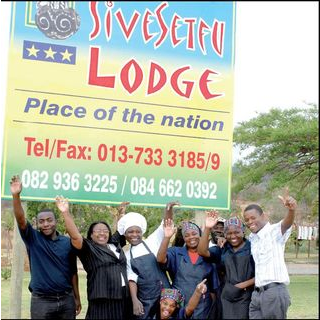
BBSDP aims to help black business owners to become more competitive and successful by giving them money to improve their businesses. The programme will give up to R100 000 per business.
Business plan
One beneficiary of BBSDP is Jabu Nyambi of Nelspruit, Mpumalanga. She received R100 000 to improve her lodge.
Nyambi, a mother of three children, bought Isivesethu Lodge after getting a loan from the bank and from the Mpumalanga Investment Initiative.
She had already saved R200 000 while running a catering business from her garage. But the money was not enough to do a business plan and to make some much-needed changes to the lodge.
Cooking
“I applied for money from the BBSDP and I was successful. Today, I am the proud owner of a lodge,” she said. “Thanks to BBSDP my lodge is growing and I am marketing it well,”
Nyambi used to be a school teacher and financial adviser. But she left these jobs to concentrate on cooking, which is what she loves doing.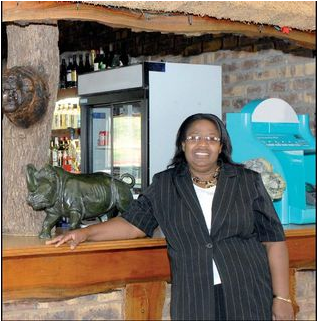
“I started cooking under a tree in a busy area in White River where there was a police station, post office and shops,” Nyambi said. But when the municipality said she wasn’t allowed to trade there, a building material shop offered her their parking area. She later started cooking and running her business from her garage.
World cup
“My biggest break was in 2004 when the Department of Health gave me a tender to cater for 21 000 people during a Women’s Day function. After that, I started catering for more big functions like gala dinners and government events,” Nyambi said.
She decided to start a restaurant and while looking for a restaurant to buy she found the lodge. Nyambi is already thinking ahead to 2010 when many tourists will visit the country for the FIFA World Cup. To accommodate them, she is fixing the lodge and making it bigger.
“I have already employed 12 full-time workers and 44 casual workers. My property is now valued at R10 million,” she said.
To qualify for funds from BBSDP, businesses must:
- be majority black-owned and have black managers
-
not make more than R12 million a year
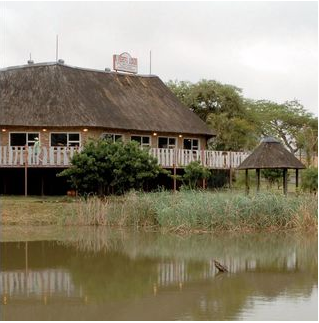
- have traded for at least one year
- be registered with the Company and Intellectual Property Registration Office (CIPRO) and SARS.
For more on BBSDP, contact the Department of Trade and Industry’s Customer Care Centre: 0861 843 384. To contact Jabu Nyambi, call:
013 733 3185
A TIME TO BE HEALTHY
A TIME TO BE HEALTHY sadminThe festive season is here and to many people this means overdoing things. During this time, more alcohol and drug related incidents and crimes are reported than usual. These include road accidents caused by drunken drivers, rape, women and child abuse, robberies and murders. Many people also forget about the risk of getting HIV and Aids when they are under the influence of drugs and alcohol.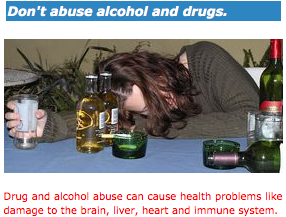
Risky drinking
Almost half of South Africa’s population is affected by alcohol abuse. This was found by the World Drug Report 2006, as well as studies by the Medical Research Council. Minister of Social Development, Zola Skweyiya, said about 17,5 million South Africans were affected by “risky drinking”. This means drinking first thing in the morning, drinking to get drunk or having alcoholic drinks instead of food at meal times.
Treatment
Studies also show that about 2,2 million South Africans use dagga, cocaine, heroin, speed, LSD, hashish, ecstasy, tik and other hard drugs. About 9 000 drug users were treated at 73 treatment centres in South Africa from June to December 2006 alone.
Health problems
Apart form accidents and violence, drug and alcohol abuse also cause health problems like damage to the brain, liver, heart and immune system. Studies show that about 500 000 South Africans suffer from Foetal Alcohol Syndrome Disorder. This means babies whose mothers drank a lot of alcohol during pregnancy are born with health problems like brain damage and heart defects or below average weight and height.
To encourage young people to resist drugs, the Department of Social Development started a youth programme called Ke Moja, No Thanks I’m Fine Without Drugs.
Dangers of alcohol
To raise awareness of the dangers of alcohol, the Department of Health has drawn up new regulations on alcohol. It will come into effect in early 2010 and is part of an ongoing plan to promote healthy living. In line with the new regulations, containers of alcoholic drinks must show messages giving the dangers of alcohol.
- These messages must include:
- Alcohol reduces driving ability, don’t drink and drive.
- Don’t drink and walk on the road, you may be killed.
- Alcohol increases your risk to personal injuries.
- Alcohol is a major cause of violence and crime.
- Drinking during pregnancy can be harmful to your baby.
For more information, call the Department of Social Development: 012 312 7794, or call 1020
Other useful contacts:
- Alcoholics Anonymous 0861 435 722
- South African National Council on Alcoholism and Drug Dependency (SANCA) 011 781 6410
- Al-Anon: 011 683 8002
- Ndivhuwo Khangale
BE A SAFE AND RESPONSIBLE DRIVER
BE A SAFE AND RESPONSIBLE DRIVER sadminRoad accidents cost our economy over R43 billion a year. - Jeff Radebe, Minister of Transport
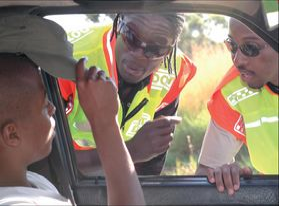 Road accidents cost our economy over R43 billion a year. - Jeff Radebe, Minister of Transport
Road accidents cost our economy over R43 billion a year. - Jeff Radebe, Minister of Transport
Thousands of people are killed or injured in accidents on South Africa's roads every year. But many of the accidents can be avoided if all of us take responsibility for our own safety and obey the rules of the road.
Road accidents do not only cause death and heartache, but is bad for the country's economy. Many people who are killed are those who are active in the economy and who support their families.
Alcohol and drugs
Drunken driving is one of the main causes of road accidents.
Driving while under the influence of alcohol or drugs makes it difficult for a driver to control the car or to act quickly in a dangerous situation. It also affects a driver's ability to judge distances between still-standing and moving objects.
A drunk driver stands to lose a lot if arrested. The punishment for drinking and driving is a R120 000 fine or six years in prison. Because drunk driving is illegal, a drunk driver will also get a criminal record.
In addition, the drunk driver's licence may be taken away and his or her insurance company has the right not to process the claim. The cars of drunk drivers who have caused accidents may also be taken away from them.
Speeding and tiredness
Speeding and tiredness are also major causes of road accidents. Speed reduces the amount of time needed to avoid a crash or to stop the vehicle. A tired driver loses concentration and cannot react quickly in emergencies.
The recent death of soccer star Gift Mpho Leremi is a reminder to everyone of how quickly road accidents can happen. With the holiday season ahead, people should be especially careful on the roads.
All of us must take responsibility for our own safety and obey the rules of the road
Rules of the road
- Never drive under the influence of alcohol or drugs.
- Keep to the speed limit and obey all traffic signs.
- Always wear a seat belt.
- Don't drive when you're tired; rest every two hours over long distances.
- Ensure that your vehicle's tyres are in a good condition; smooth tyres make it difficult to control your vehicle.
- Make sure your vehicle's brakes are in a good condition.
- Don't use a cell phone while driving; it is illegal and makes it difficult to control your vehicle.
- Keep your following distance.
- Don't overtake another vehicle unless you're sure it's safe.
BE WARY OF ATM CRIMINALS
BE WARY OF ATM CRIMINALS sadminThe end of the year is a time for festivities, but criminals are also licking their lips, waiting to pounce on unwary people. Before you travel or visit friends and family, take safety measures and protect your 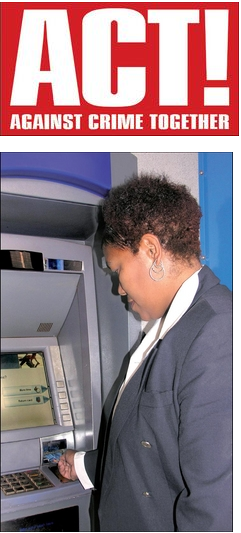 belongings. When drawing money, be wary of ATM criminals.
belongings. When drawing money, be wary of ATM criminals.
Robbed
Mr Khuli, a 49-year-old factory worker, clearly remembers what happened to him last year. He just got his December bonus and really looked forward to spoiling his wife and children.
He went to the nearest ATM to draw money to buy them some goodies. He knew the area well and didn’t think anything bad could happen. When he put his card into the machine and entered his PIN, the machine returned the card. Then someone came to him from nowhere and offered help, but the card still didn’t work. The man advised Mr Khuli to report the problem at his bank, but the bank was already closed.
The next morning, he was first in the queue. He left his luggage with a street seller next to the entrance. When the bank assistant told him that all his money had been withdrawn, he nearly fainted. He stumbled outside to get his luggage, but the street seller was gone. He had been robbed of his money and his luggage.
Tips to avoid criminal activity at ATMs
- Never give your card or your PIN to anyone, not even a bank official, security personnel or a police official.
- Avoid ATMs in deserted places or late at night.
- Avoid drawing money when you are alone.
- If you feel unsafe at an ATM or if you distrust people hanging around, leave immediately and use another ATM.
- Never write down your PIN or carry it anywhere near your ATM card. Memorize it and keep it a secret.
- Keep telephone numbers for reporting lost or stolen cards.
While using the ATM
- Never accept any help from strangers or let a stranger touch your card.
-
Insert your card only when instructed to do so by the display screen.
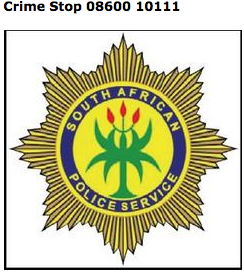
- Never force your card into the card slot.
- Be sure no one is looking over your shoulder when you key in your PIN.
- Cancel your card if the machine swallows it by calling the card stop number.
After the transaction
- Make sure that the machine returns your card after you have drawn money.
- Rather draw small amounts of money. Some banks can set your daily limit.
- Do not count your money in front of the ATM.
- Be watchful of people following you (on foot or in a car). If you think you are being followed, get yourself to the nearest public place as quickly as possible.
- South African Police Service
DON'T BE SCARED OF BIG BUSINESS
DON'T BE SCARED OF BIG BUSINESS sadminTune into your radio or television or look through the business pages of newspapers and you will be greeted by scary words like the Johannesburg Stock Exchange, investments or stocks and shares. Just what are these things and why do we have to care about them? Vuk’uzenzele went to the Johannesburg Stock Exchange, or the JSE as it is commonly known, for some answers.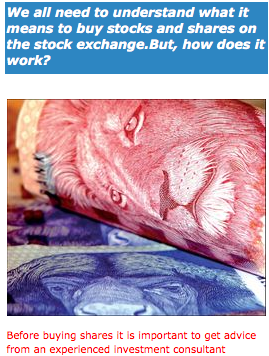
What are stocks and shares?
The main buyers of stocks and shares are usually big financial institutions like insurance companies, but private investors may also buy stocks and shares.
Stocks and shares, which are also sometimes called equities, are basically the same thing. They represent ownership in part of a company or corporation. This means you buy shares or stocks in a company.
By doing this, however big or small, you invest some money in the company and become a part owner of the business, sharing in its success or failure. If you own shares you will receive dividends from the company. Dividends represent part of the company’s profits.
What is the stock exchange?
A stock exchange is also sometimes called a stock market. It is like an organised marketplace where people trade (buy and sell) the shares of big companies which are on the official list of the stock exchange.
The people who work at the stock exchange and who help their clients buy shares are called stock brokers or dealers. They work in line with strict rules and regulations.
Many countries have stock exchanges where shares of companies in that country are traded. South Africa’s stock exchange is the JSE in Johannesburg.
Why buy shares?
Buying shares is a way to grow your money. If the company whose shares you bought is successful and grows, your shares will also grow. On the other hand, if the company is unsuccessful, your shares will drop. So before buying shares, it is important to get advice from an experienced investment consultant on which shares to buy.
A person who owns shares is called a shareholder. Shareholders have the right to vote on decisions about the company.
For more information on the stock exchange, you can ask an investment consultant at your bank to help you, or contact the JSE Education Division: 011 520 7127.
- Ndivhuwo Khangale
BECOME ARTISTIC IN FIGHTING POVERTY
BECOME ARTISTIC IN FIGHTING POVERTY sadminTraditional crafts in South Africa can play an important role in empowering rural communities while promoting our cultural heritage.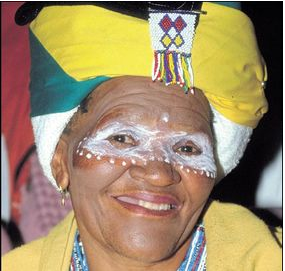
Fighting poverty, creating jobs and empowering people through cultural projects are the main aims of the Investing in Culture Programme. The programme was started by the Department of Arts and Culture. It gives funding to help people get the neccessary skills to produce crafts and to get access to markets where they can sell their goods.
Teach and empower
The Investing in Culture programme could become a major tool to teach and empower the poorest people. It could also renew cultural activity as an important part of community life, in rural and urban areas.
The programme is meant to reach the poorest of the poor, empower rural communities, urban poor, and women and youth, while promoting our cultural heritage.
Municipalities
The Investing in Culture programme has the support of other government programmes like the Expanded Public Works Programme (EPWP), the Integrate Sustainable Rural Development Programme and the Urban Renewal Programme. Some projects also form part of the integrated development plans of municipalities.
Projects
Projects can include things like traditional beading and African jewellery, clothing, baskets, weaving and fabric painting, woodcutting and leather work, or music, singing and dancing.
South Africa has a rich variety of cultures. All of them have their own special arts and crafts, including music and dance. Through the Investing in Culture Programme, people can learn new skills and earn money.
Who can get funding from Investing in Culture?
- Preference will be given to previously disadvantaged communities, and to women, youth and disabled people.
- Projects must relate to arts, culture and heritage.
- Projects should be truly South African.
- Beneficiaries must show that they are serious about learning new skills and growing their projects.
-
Projects must have the possibility of becoming b
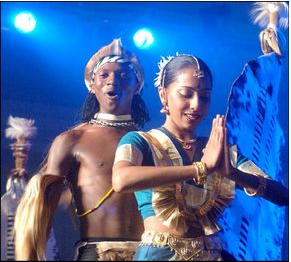 usinesses that will make money.
usinesses that will make money. - Projects must be run and owned by communities or should directly benefit the community in terms of jobs, training or partnerships.
- Projects must be able to support and promote tourism.
To contact the Investing in Culture Programme, call the Department of Arts and Culture: 012 441 3000, or call 1020
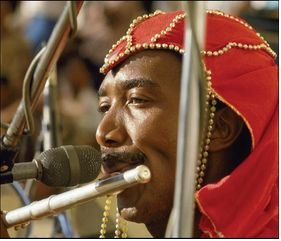
CARTOON STRIP
CARTOON STRIP sadmin

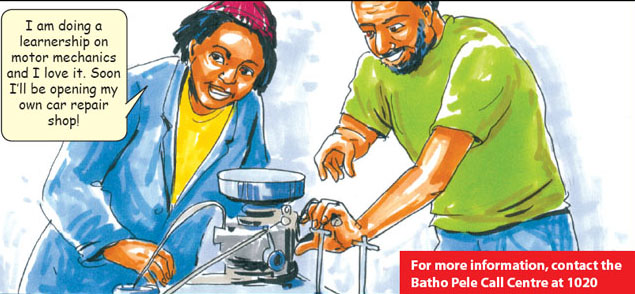

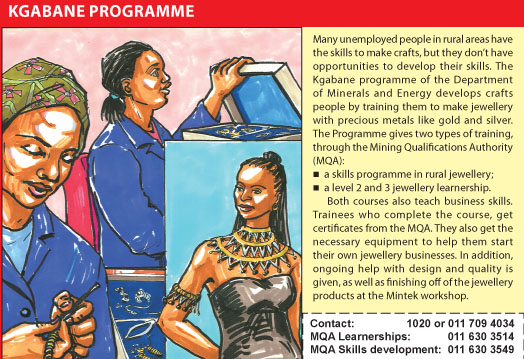
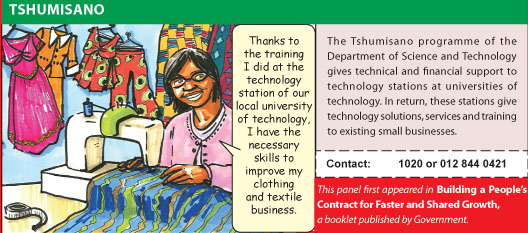
CREATING JOBS FOR YOUTH, AND FIGHTING POVERTY
CREATING JOBS FOR YOUTH, AND FIGHTING POVERTY sadminAre you a young person living in the Northern Cape and want to train for a job? The Northern Cape provincial government will place more than 5 000 young people in the National Youth Service (NYS) 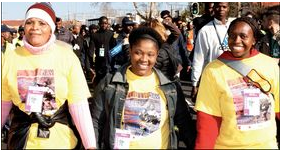 Programme aimed at fighting poverty and unemployment in the province. The programme aims to train young people in the province in the construction industry. They will also be involved in maintaining government property through government’s plan to improve and repair public buildings.
Programme aimed at fighting poverty and unemployment in the province. The programme aims to train young people in the province in the construction industry. They will also be involved in maintaining government property through government’s plan to improve and repair public buildings.
Training
The programme is co-ordinated by the provincial Department of Transport, Roads and Public Works.
Speaking at the opening of the NYS programmes in Kimberly recently, Northern Cape Premier, Dipuo Peters, said the department has already chosen 500 youths for jobs. They will be given training in skills like painting, carpentry, bricklaying, plumbing, welding and electrical technology.
Job opportunities
The NYS programme is a Presidential plan that aims to create jobs and reduce poverty by getting young people to become part of government’s drive to improve service delivery.
The programme was started in 2004 by the Presidency as a way to help government achieve the goals of the Joint Initiative for Priority Skills Acquisition (Jipsa).
In line with the Accelerated and Shared Growth Initiative for South Africa (AsgiSA), the programme provides the youth with ways to rebuild South African society by improving skills, creating jobs, fighting poverty, improving service delivery and maintaining government property.
or more information, contact the Northern Cape Department of Transport, Roads and Public Works on 0538392225 or 0538392240
- BuaNews
JIPSA REACHING ITS GOALS
The Joint Initiative for Priority Skills Acquisition, better known as JIPSA, is reaching its goals. It was started about 18 months ago to grow skills that are critical for our country’s growth.
By finding out which skills are most needed and finding ways to develop those skills, it is helping the country to reach its goal of 6% economic growth. This is achieved through the joint efforts of government, the private sector, and international partners.
Graduates
In the past 18 months, more and more local and international partners have joined in projects to develop skills. Companies Like Eskom, Transnet, Shoprite Checkers, Old Mutual, Xstrata, Microsoft and the American Chamber of Business (AMCHAM) have helped to place and train more than 20 000 graduates in different fields. These include hospitality, tourism, project management, construction, information and communication technology (ICT), science, finance, commerce, engineering, agriculture and town planning.
International
Through the international placement programme, more than 100 graduates are training at various centres in India. About 300 graduates will be trained in China and 150 young women professionals will be placed in companies in the Netherlands.
Training and jobs
The HP Business Institute Initiative will spend R150 million to help small black-owned ICT companies. Microsoft, Cisco and Oracle are planning to start an ICT centre for training and job placement.
Don't overspend - avoid the debt trap
Don't overspend - avoid the debt trap sadminThis is the time of year for fun and celebration, but make sure you don’t overspend
The introduction of the new National Credit Act changed many people’s lives. Thanks to the Act, which was introduced in June 2007, thousands of blacklisted people who qualified for amnesty had their 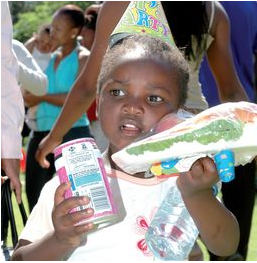 names removed from the list. They will now be able to buy on credit, but more importantly, they will also enjoy more protection when entering into credit agreements.
names removed from the list. They will now be able to buy on credit, but more importantly, they will also enjoy more protection when entering into credit agreements.
Credit education
Although the Act was introduced to protect us as consumers against lenders, we are still responsible for managing and spending our money wisely. It is easy to buy on credit, but before signing a credit contract, make sure you can pay back your debt.
To help consumers work wisely with their money and avoid falling into the debt trap again, the Act also gives credit education.
Spend wisely
At this time of the year, many people will receive bonuses or stokvel payouts. Others will be sharing the money they saved throughout the year, the so-called mogodisano in seSotho.
The Credit Information Ombudsman gave some tips on how to avoid overspending.
- Make a list of all the things you want to buy for the December holidays. Then add your January expenses to the list.
- From the main list, make a sub list of the critical needs like rent, food, transport, school fees and uniforms for January and put aside enough money for it.
- If you know that you cannot hold on to cash for a long period, you can ask your employer to keep some of your bonus and pay it to you in January.
- Leave enough money to enjoy the festive season, but spend wisely to avoid the loan sharks (mashonisa) in January.
Tips for saving money over the holidays
- Set aside between 15 and 20 per cent of your bonus or savings for a longer term goal like retirement, education or housing.
- You don’t have to buy expensive Christmas gifts. Rather find out what someone really needs and buy a less expensive, but useful gift or make something.
- Think of three things that you can cut down immediately, like alcohol or cigarettes and use the money for something you really need, or save it.
- If you are a member of a stokvel, encourage members of your group to put aside some of the money they would use for year-end-parties for something like paying school fees up front.
For more information or free advice on the new Credit Act, call the office of the Credit Information Ombudsman: 0861 662 837.
FUN PAGE
FUN PAGE sadmin
GIVE US A PIECE OF YOUR MIND
GIVE US A PIECE OF YOUR MIND sadminWINNING LETTER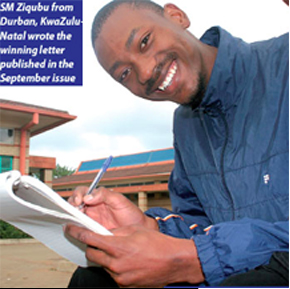
Fight for your children’s future
I am 20 years old and had a baby boy last year when I was in grade 12. I was taking care of my boy and failed my matric. But I re-registered to re-write at the end of the year. I would like to encourage young girls to take a stand and fight for their children’s future. Relying on a man is not an option and our parents are not going to be around forever. The only key to a great career and a brighter future is through education. I believe in myself and learned from my mistakes. Not that my son is a mistake - he is a blessing, but having him so early in my life was wrong. Now I am going to school to give him a bright future. I don’t want to be a statistic, but an individual who made a difference instead of feeling sorry for myself.
- Nokhuthula Nkosi, Sebokeng, Gauteng
Schools not meant to produce babies
I’m giving the Minister of Education gigantic applause and a salute for not promoting maternity leave for learners. She said that learners were at school to learn and I’m adding to that; schools are not meant to produce babies. If a learner wants to be a mother she must be independent and be able to do things for herself and the baby. Likewise, a guy should look for a job to feed his family and himself.
- Salome Mogale Sekete , Atteridgeville, Gauteng
Real men support children
It is unfair for men to make women pregnant and desert them. Statistics show that most children are abused by their stepfathers. If men could stick to their responsibilities as fathers, it would contribute to the reduction of sexual abuse to children. Poverty would also decrease if fathers are there to support their children. I urge all fathers to be responsible and help the government to fight poverty and child abuse by being there for their children. Real men don’t desert their children!
- Bethuel Mokhari, Zebediela, Limpopo
Keeping our children safe and sound
Your article Keeping Our Children Safe and Sound has inspired me. I am a young man who has always had a passion to stop violence against children here in Lebowakgomo. After reading your article, I’ve decided to start early childhood development here. Many children take drugs because they have nothing to do during their after school hours. I have a plan to start play groups, nursery schools and after school centres where children can learn and play. Your article came as a first step, because now I know where to go for help.
- Ernest Leboho, Lebowakgomo, Limpopo
You too will grow old
The saying goes: “Let no granny’s tear fall to the ground, for you will be cursed.” No one can deny that the elderly are our guardian angels. To see young people mistreat or abuse them is a hard pill to swallow. They helped us to learn and make something of our lives. We need to show our gratitude. Society should stop despising and punishing them simply because they are old and wrinkled. It is no crime to grow old. To all those who mistreat them, don’t forget that you too will grow old one day.
- Joseph Sithole, Tweefontein, Mpumalanga
What can we do to help government?
We must stop relying on government’s promises and start doing things that are fruitful in our own lives. Government can only help those who are also doing everything they can to help themselves. Government will not be able to stop crime if we don’t help them. They can’t stop women and child abuse unless we help them to combat such barbaric activities. We must not always think of what government can do for us, but rather what we can do to help our government.
- Dumazi D Forster, Malamulele, Limpopo
Overspending on matric farewell
I know how much matric farewell functions mean to grade 12s. The problem is overspending for one day’s function. On the other hand, there’s the problem of not having fees to register at an institution of higher learning. Please save those rands for registration rather than buying expensive farewell clothes. The choice is yours. Would you like to pursue your career and get skills or join the mass of unskilled people?
- Peolwane Kleinbooi Mabaso, Bothaville, Free State
They deserve a chance
I appeal to government to give amnesty and remove the criminal records of ex-offenders who finished their sentences in correctional centres as part of their punishment. Offenders are also human and they deserve to be given a second chance to prove that they rehabilitated successfully. I also urge the private sector and government to give young ex-offenders a second chance by giving them jobs without considering their criminal records.
- Thomo Nkgadima, Lynn East, Gauteng
Volunteer and gain experience
You've passed your matric or qualified at a tertiary institution. You try to find a job, but they ask for experience, because most companies only want to employ people who have experience in a particular job. Voluntary work is the best way to gain work experience. So don't hesitate, go for voluntary work at your nearest police station, clinic or hospital. You may even be offered a permanent job after a while. Just try it and see the results.
- Nonhlanhla Cele, Matatiele, Eastern Cape
Taking the first step
As a former volunteer, I would recommend that all unemployed people gain experience, training and knowledge through volunteering. I am currently a receptionist and have gained reception skills and experience through being a volunteer at the Boksburg Child Welfare. Thanks to Vuk’uzenzele I have learnt that I can volunteer as an administrator for the South African Police Service, which will enable me to be employed as an administrator in future. To all South Africans, I want to say let’s take the first step and try to better our lives.
- Meredith Goeieman, Delmore Park, Gauteng
We receive hundreds of letters and e-mails from you. Everyone will get a response. Remember to include your name and surname.
PLEASE NOTE: To win a radio/cd player or radio set, include a physical address and a contact telephone number.

Write to: Vuk'uzenzele, Private Bag X745, Pretoria, 0001, or e-mail: vukuzenzele@gcis.gov.za.
If you don't want to have your real name published, you may use a different name, but please include your real name and address to us.
HEALTH ADVICE: DIABETES
HEALTH ADVICE: DIABETES sadminWhat is diabetes?
Diabetes is a condition which occurs when the body cannot make or use insulin correctly. Insulin is a hormone that turns the sugars in the foods we eat into energy. When a person has diabetes, too much sugar is found in the blood. Over time this can damage the heart, blood vessels, eyes, nerves and kidneys, and cause foot ulcers which could lead to amputation. There are two types of diabetes:
- Type 1: The body cannot make insulin. People with type 1 diabetes require daily injections of insulin to control their condition.
- Type 2: The body cannot use the insulin that it makes, or the insulin that it makes does not work correctly.
Most people with diabetes have Type 2 diabetes.
What are the signs and symptoms of diabetes?
- The symptoms of diabetes are
- Feeling tired and irritable
- Urinating more than normal
- Being very thirsty
- Unexplained weight loss
- Blurred vision
- Poor wound healing
Some individuals, especially older persons with Type 2 diabetes, often do not have any symptoms
Who is at risk?
- Anyone can develop diabetes, but some people are more at risk than others.
- Over 60 years old
- Overweight
- A family history of diabetes
- People of Asian origin
- High blood pressure
- Women with previous diabetes developed during pregnancy or high birth-weight infants (more
- than 4 kg)
How is diabetes diagnosed?
A blood test can establish whether or not you have diabetes and can be done at your local clinic
How can I prevent diabetes?
Diabetes can often be prevented, or the onset delayed, by eating correctly, exercising regularly, maintaining a normal body weight and by not smoking.
How is diabetes treated?
Treatment of diabetes involves changing your lifestyle and lowering the blood glucose level by either taking tablets or insulin injections regularly. People with Type 1 diabetes need to use insulin to regulate their blood-sugar levels. Oral medication may be prescribed to people with Type 2 diabetes and in some cases, insulin may be needed. Healthy eating, regular exercise and maintaining a normal body weight are the best ways to keep diabetes under control. Be physically active - at least 30 minutes of regular, moderate activity on most days of the week. More activity is required for weight control.
What if I already have diabetes?
If you already have diabetes, a healthy diet and regular physical activity can lead to a reduced need for Type 2 diabetes medication. It will also delay the onset of complications.
Diabetes damages blood vessels and nerve cells and thus increases the risk of heart disease or stroke. Diabetes can cause blindness and is a leading cause of kidney failure. Ensure that you have your blood sugar level checked regularly. If your diabetes is controlled, your chance of developing complications is greatly
reduced.
INTERNATIONAL PARTNERSHIP TO IMPROVE SOCIAL SERVICES
INTERNATIONAL PARTNERSHIP TO IMPROVE SOCIAL SERVICES sadminMany unemployed young people will benefit from an agreement signed by South Africa and Cuba. The agreement will help unemployed youth to be trained as social workers. The agreement, signed by the South African Ministry of Social Development and the Cuban Ministry of Labour and Social Security, is part of government’s plan to fight poverty, and improve social services, especially to the poor. By training social services professionals, it will also help to develop skills and create jobs.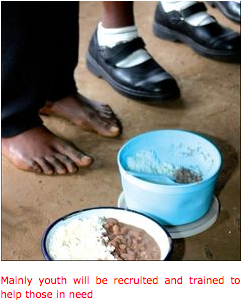
Poor communities
In line with the agreement, special focus will be placed on improving services to women, youth and children in poor communities as this is where there is the greatest need. Development programmes will also be started in these communities
Training
To put the agreement into practice, South Africa’s Department of Social Development will work with the Cuban Ministry using a work training plan with two stages. The plan, which was developed in Cuba, is made up of a formal university-level programme and a 12-months practical social work training programme.
Training will cover areas like services to needy and helpless groups including children, the elderly, the youth, women and people with disabilities, poverty relief, community development and training of social services professionals in various fields.
Communities
The department will start a national recruitment programme focusing on getting youth from rural and poor communities who are interested in helping to relieve the suffering of other people, to train as support social workers. After completing their training, they will be placed back in their communities to help the department deal with the backlog of cases there. These include support for orphans and other needy children, youth, and the elderly and people and families affected by HIV and Aids.
Technical knowledge
The agreement with Cuba will also include study tours and exchanges of technical knowledge on developing social services policies.
Contact details :
Call the Department of Social Development on 012 - 312 7653
– BuaNews
KEEPING THE PROMISE
KEEPING THE PROMISE sadminAbout 39,5 million people are living with HIV and Aids worldwide. World Aids Day aims to strengthen the partnership between all who are involved in the fight against HIV and Aids, including governments, the private sector and communities.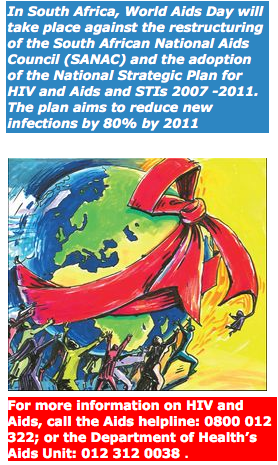
World Aids Day was started by the World Aids Campaign in 1997 to look at what has been achieved in the fight against the disease. It also encourages leaders and decision makers to keep their promises. These include ensuring access for all to treatment, care, support and prevention by 2010.
Theme
The theme for World Aids Day, “Stop HIV and Aids. Keep the Promise”, was adopted in 2005. It is set to continue until 2010. It aims to remind world leaders who are involved in the fight against HIV and Aids of the promises they made and their responsibility to deliver on these promises. This means they should show their leadership and commitment at all levels to provide care and stop the spread of the disease.
Countries are encouraged to organise events around this theme, but may also choose their own sub-themes in line with their particular needs.
Organisers
The organisers of the World Aids Day Campaign include the Global Network of People Living with HIV/Aids, the International Community of Women Living with HIV/Aids, the Youth Coalition, the Global Unions Programme on HIV/Aids, the International Council of Aids Service Organisations, the Ecumenical Advocacy Alliance and the International Women on Aids Caucus.
Partnerships
South Africa will commemorate the day under the main theme, but the focus will be placed on renewing and strengthening partnerships to fight the disease. The fight against HIV and Aids is not the responsibility of government alone. World Aids Day will serve as a reminder to our leaders that all role players must be consulted in HIV and Aids programmes. In this way, communities, civil society organisations and the business sector can take hands to work together with government to fight the disease and stop it from spreading.
Safe sex
Families and individuals are a very important part of the partnership. People are still reminded that to prevent infection with the virus, they must take responsibility, live healthy lifestyles and practice safe sex. This year on 1 December, the fight against HIV and Aids will be in the spotlight all over the world.
- Muzi Mkhwanazi
Keeping it brief
Keeping it brief sadminSpeeding up LAND REFORM
To help speed up land reform and improve agricultural production, government will start a Land and Agricultural Reform Project which will run together with its existing land reform programme. The 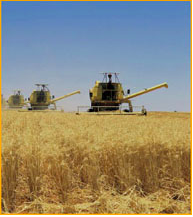 project will focus on land acquisition and helping inexperienced farmers in rural areas to get farming skills. It will also give new farmers access to agricultural services and land development programmes, as well as financial aid through finance schemes. Among the farm land targeted for redistribution, are areas along the N2 highway in the Western Cape and in Mpumalanga. The project aims to contribute to government's 2014 objectives of halving poverty, growing the economy and creating six million new jobs.
project will focus on land acquisition and helping inexperienced farmers in rural areas to get farming skills. It will also give new farmers access to agricultural services and land development programmes, as well as financial aid through finance schemes. Among the farm land targeted for redistribution, are areas along the N2 highway in the Western Cape and in Mpumalanga. The project aims to contribute to government's 2014 objectives of halving poverty, growing the economy and creating six million new jobs.
- BuaNews
KwaZulu-Natal
Hundreds of traditional leaders from all over the world gathered in Durban from 25 to 26 October to discuss their role in democracy. The conference, hosted by the KwaZulu-Natal Local Government and Traditional Affairs Department, was the first of its kind in South Africa. It is fitting that it was held in KwaZulu-Natal since the province has the highest number of traditional leaders in the country.
- BuaNews
Mpumalanga
Following the destructive wild fires in the province, the provincial Department of Local Government and Housing is building a disaster management centre. The fires killed 17 people since the end of July. The new centre will include an early-warning system, as well as situation reporting and data collecting systems. To help people deal with disasters in future, a disaster management awareness campaign was also started.
- BuaNews
Limpopo
The first intake of young people from across Limpopo started courses in skills training with the Department of Public Works in October. Some 574 young people from Limpopo's poorest areas are trained in skills like welding, brick laying, electrical work, landscaping and painting. They will then get a chance to practice their new skills on public works maintenance projects.
- BuaNews
Western Cape
With the holiday season approaching, Cape Town has appointed a task team to tackle crime on its beaches. This is in response to an increase in beach muggings, poaching and illegal off-road driving. The coast belongs to all South Africans and their rights of access to the beaches must be safeguarded. The task team will also look at littering and illegal dumping along coastal routes.
- BuaNews
Eastern Cape
More than 120 local people are to benefit from a multi million rand road construction project in the small town of Alicedale. The Alicedale Road Construction Project will extend from the N10 to Alicedale and will take 32 months to complete. It forms part of the provincial government's efforts to create jobs and fight poverty. Along with the road construction project, the International Rugby Academy will also be built in the area.
- BuaNews
North West
Since 2005, the official unemployment rate in the province has been reduced from 28 percent to 27,4 percent, thanks to money being invested in industries like mining, farming, and tourism. Most of these investments are promoting small business, helping to create jobs and fighting poverty.
- BuaNews
For more information about news items featured on this page, call 1020
MAKE SURE IT’S THE RIGHT CHOICE ON HIGHER EDUCATION
MAKE SURE IT’S THE RIGHT CHOICE ON HIGHER EDUCATION sadminThis time of the year, many matriculants are looking forward to further their studies at tertiary institutions like colleges and universities. Students who have finished their junior degrees will also have to decide whether they want to study for post-graduate degrees.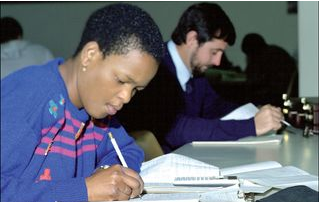
Until about 1990, it was easy to decide where to go because there were only state-owned colleges, technikons and universities. But now there are also many private institutions to choose from.
Registered
While there are some good private institutions, lessons learned from all over the world have shown that such institutions have to be controlled properly.
John Mojapelo of the Department of Education said some of these institutions robbed the public of their money by charging too much, while others were not registered in line with the Regulations for Private Higher Education Institutions.
Responsibility
Mojapelo said the Department of Education advises the public to make sure the private institutions they choose are registered and charge reasonable fees.
But while the department has the responsibility of advising the public to be cautious, it is the responsibility of students and their parents to get information and make informed decisions, he said.
The Department of Education keeps an updated list of registered private higher education institutions called the Register of Private Higher Education Institutions. You can ask them to post, fax or e-mail the register to you, or you can collect it at the department’s offices.
Studying at a tertiary institution after school is an important step towards your future career. You put a lot of money and effort into your studies, so if you decide to study at a private institution, make sure it is not a fly-by-night one.
For more information, call 012 312 5320/ 5481/ 5446/5253, or send a fax to 012 324 6343, or e-mail registrarphei@doe.gov.za
Tips to help you decide where to study
- Make sure the institution has a good name.
- Check if the institution is registered with the Department of Education before you pay any money or enter into an agreement.
- Check with the Department of Education if the institution’s registration number is real.
- Be aware that no private institution may use the name Technikon or University.
- A registered private institution must have a prospectus or brochure giving the registration status of the institution, the names of managers and teaching staff and their qualifications, admission requirements and procedures, fees, and courses and subjects offered.
- When an institution’s registration is cancelled, you have the right to get your money back and to get copies of your academic record and certificates. You also have the right to be transferred to a similar public or private institution to complete your studies.
MEET PROFESSOR MARWALA, THE COMPUTER WHIZZKID
MEET PROFESSOR MARWALA, THE COMPUTER WHIZZKID sadminWhere and how do you start writing about someone with a 30-page CV like Professor Tshilidzi Marwala?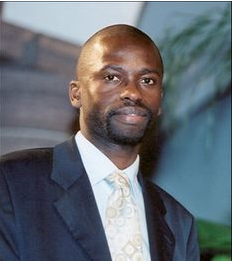
At the age of 36, Marwala is one of the youngest professors of engineering in the country. Marwala, who comes from a small village in Venda, is Professor of Systems and Control Engineering at the School of Electrical and Information Engineering at the University of the Witwatersrand.
Hard work
Despite his success, Professor Marwala has remained a humble person. “I come from a humble background. My father is a teacher and my mother an administrator. They taught me that you can have talent, but without working hard you will end up nowhere,” he said when asked about his achievements in the academic world. “I have always been inspired by people around me. Of the 126 learners in my Grade 12 class, 10 have PhDs. Others are still studying, while some are in the highest senior positions in big companies,” he said.
Thinking computer
His latest research is based on designing a computer that thinks like a human being. This intelligent computer is used to check the “health” of a bridge or a building. It tells if a structure is about to fall down or not. Marwala says this is called “artificial intelligence.”
Medical information
Marwala has also designed a computer that “finds” missing information from a database, like a record of your medical information. For example when you are pregnant, doctors will ask you a number of questions about your family to see how it can affect your child. But sometimes the doctor doesn’t ask everything and this leaves gaps in the database. The computer is able to understand all the information and will work out what is not included in the database, he said.
Awards
Marwala has done a great deal of other research and has written and published over 170 research articles and journals. He has also won many awards both nationally and internationally.
Marwala, who is married and has a four-year-old son, is a director and a member of the board of directors of many companies. He teaches more than 30 PhD engineering students.
Marwala’s background
Tshilidzi Marwala was born in Duthuni, Venda in Limpopo in 1971 and matriculated in Sibasa in 1989. He has studied in America, the University of Pretoria and at Cambridge University in England and completed his PhD degree. He became Professor at the University of the Witwatersrand in 2003 and is currently also chairperson of System and Control Engineering in South Africa. He has previously worked at the CSIR and for South African Breweries.
NDEBELE TRADITIONAL DRESS
NDEBELE TRADITIONAL DRESS sadminThe second in our series on South Africa’s cultures, looks at the traditional dress of the Ndebele, who are particularly well known for their beautiful bead work and colourful wall 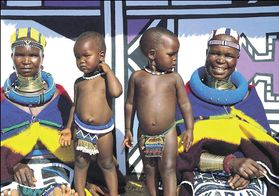 paintings.
paintings.
Ndebele women and girls
Ndebele woman take great pride in their dress. Their traditional dress is colourful and bright and is decorated with a lot of beautiful bead work. A woman’s traditional dress shows her age and status in the community. A married woman traditionally wears a blanket over her shoulders with a lot of thick beaded hoops of twisted grass, called “isigolwani” around her neck and legs. She also wears copper and brass rings or “dzilla” around her arms, neck and legs. The blanket or “nguba” is usually one with stripes of green, red, blue, yellow and brown.
Married women also wear some form of head covering as a sign of respect for their husbands. These range from a beaded headband or a knitted cap to fancy beaded headdresses called “amacubi”.
Little girls wear beaded aprons or beaded skirts, while older girls who undergo initiation wear many thick “isigolwani” around their necks, arms, legs and waist. They also wear “isiphephetu”, a beaded apron given to them by their mothers as a symbol of entering into womanhood.
Ndebele men
The traditional dress for Ndebele men is not as colourful as that of the women. The main item of clothing for men is a breast-plate or “iporiyana”, which hangs from the neck. It is often 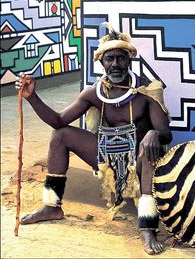 decorated with beads around the top and is made from animal skin. The “iporiyana” is a symbol of manhood and is given to a young boy by his father after he has undergone initiation.
decorated with beads around the top and is made from animal skin. The “iporiyana” is a symbol of manhood and is given to a young boy by his father after he has undergone initiation.
Ndebele men also wear animal skin head bands and ankle bands. To keep warm, they wear an animal skin ‘“karos” around their shoulders. Animal skin traditionally played an important role in men’s dress because each Ndebele group is associated with a different animal. For rituals and ceremonies, Ndebele men wear ornaments made for them by their wives.
REAL MEN DON'T ABUSE WOMEN AND CHILDREN
REAL MEN DON'T ABUSE WOMEN AND CHILDREN sadminThis year’s 16 Days of Activism campaign will start on the same day as International Day of No Violence Against Women on 25 November, and end on International Human Rights Day on 10 December.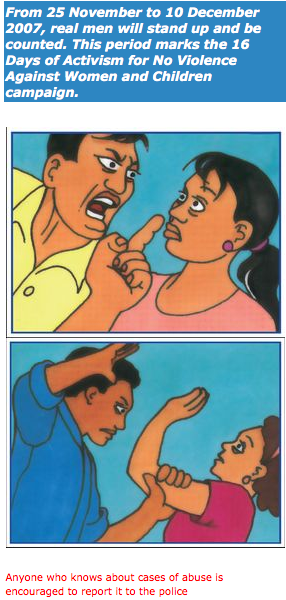
Focus
This year, the campaign focuses on men. “Not all men are abusers. There are many good men out there, and these are the people we want to help us fight women and children abuse.” said Provincial and Local Government Deputy Minister, Nomatyala Hangana.
It is frightening that you can no longer only tell your children not to accept gifts and sweets from strangers. Hangana said. “You also have to warn them against their fathers, uncles, other close relatives and neighbours who are supposed to protect them.”
Rural areas
Last year’s focus was on rural areas, informal settlements and farming communities, because these areas are mostly affected by abuse. One of the reasons is that people in rural areas often lack information because they don’t have access to modern technology like computers and television.
Men can speak
Studies have shown that last year’s campaign was a success. Many people, especially in the rural areas of the Free State got information about abuse and how to deal with it, Hangana said. This year’s campaign will continue to focus on rural areas, but will be aimed especially at men.
This is not only because men are often the abusers, but also because men can speak out against it. Hangana said they were working with men’s organisations and non-governmental organisations to encourage men to speak openly about how bad it is to abuse women and children, Hangana said.
PSL games
Events like Premiership Soccer League games will also be used to teach spectators about the importance of not abusing women and children. The Department of Correctional Services will contribute to the campaign by getting ex-offenders to talk against abuse.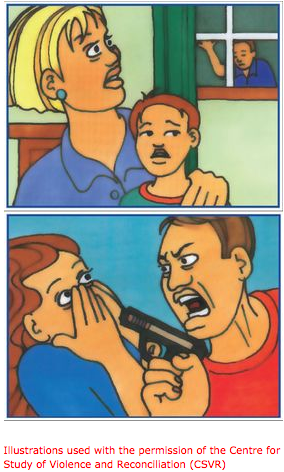
The Department of Education will get schoolboys to teach other boys to protect girls and not to abuse or bully them, Hangana said. “The struggle to stop abuse has started, but government cannot win it alone,” she said. Everyone in society must work together with all the different organisations that deal with abuse to help government. “We want to encourage victims and communities to report cases of abuse to the police.”
Men’s march
A march by men only called the Men’s March will mark the start of this year’s campaign. Provinces and municipalities will organise their own marches and events against abuse. During this time, people are asked to show their support for the fight against abuse by wearing stickers or white ribbons.
There will also be a postcard campaign where you can sign and post a special card with an anti-abuse message. The money raised is managed by the Human Rights Foundation, which gives it to struggling organisations dealing with abuse.
“More than R1,6 million was made and given out last year. The board of the Foundation decides which organisations and charities will benefit,” Hangana said.
Facts and figures
The 16 Days of Activism is also used as an opportunity for government to get facts and figures about abuse, like how many women and children are abused. Cases are then handled throughout the year with the support of the National Action Plan. This becomes 365 Days of Activism.- Ndivhuwo Khangale
Cases of abuse are handled throughout the year. This becomes 365 Days of Activism
SUPPORT FOR WOMEN AND CHILDREN
- National Crisis Helpline (Lifeline): 0861 322 322
- People Opposed to Women Abuse: 011 642 4345
- Stop Gender-based Violence Helpline: 0800 055 555
- Childline tollfree helpline: 08000 55555
- Ndivhuwo Khangale
Save a Life - Donate your organs or blood
Save a Life - Donate your organs or blood sadminMany lives can be saved if more people offer organs like heart, liver, kidney or lungs to be transplanted into sick people after death.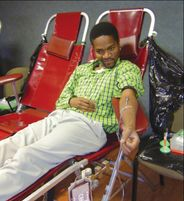
As an organ donor you will also be saving government millions of rands because the treatment of patients who need organs is very expensive. A patient who needs a kidney, for example, costs the government almost R80 000 per year for treatment. One session of haemodialysis – the process of using a machine to clean the blood of a kidney patient – costs government about R876 per session.
A second chance
Christopher Makhamele, one of the lucky patients who received a kidney from a donor, said he was blessed. “God has given me a second chance to live my life for my children,” he said. Thousands of people like Makhamele need organs to save their lives. The most needed organs are kidneys, lungs, hearts, livers, bone marrow and corneas (the clear covering of the eye).
Cultural and religious beliefs are the main reasons why people don’t donate their organs. Makhamele believes there is no need to fear parting with your organs after your death. “The decomposed body shows that the ancestors live in the spirit and not in the dead body,” he said.
Blood
Donating blood is another way of saving people’s lives, especially with the high number of road accidents during the holiday season.
But it is not only accident victims who need blood. People with certain cancers like cancer of the blood and bone marrow, HIV and Aids patients, people who had operations and women who bleed a lot when giving birth, also need blood transfusions.
The South African National Blood Service says that you shouldn’t fear that you may get HIV and Aids from donating blood. The needles they use are clean and are used only once.
About 3 500 South Africans are waiting for organ and tissue transplants, which can save their lives. But because of a shortage of donors less than
1 000 of them will receive a transplant.
The demand for blood is always higher over the holiday season. You can save lives by becoming a blood donor
How can I become an organ donor?
- Register as an organ donor with the Organ Donor Foundation free of charge.
- Write a will stating that you want to donate your organs when you die.
- Tell your family about it so that they will not resist when your organs are taken.
For more information or advice, call the Department of Health: 012 312-3278, or the Organ Donor Foundation of South Africa: 021 426-0198, or 011 489-1193.
Who can donate blood?
Any healthy person between the ages of 16 and 65 who weighs 50kg or more, and who follows a healthy lifestyle can donate blood. There is no danger in donating blood and it is not painful. Before you can donate, specially trained staff will make sure that it is safe for you to donate.
For more information, contact the South African National Blood Service: 0800119031
THERE'S STILL TIME TO APPLY FOR FURTHER STUDIES
THERE'S STILL TIME TO APPLY FOR FURTHER STUDIES sadminThe end of the year is a time when many matric learners experience some stress. They are waiting for their exam results and have to make decisions about their future careers. Many also stress because they 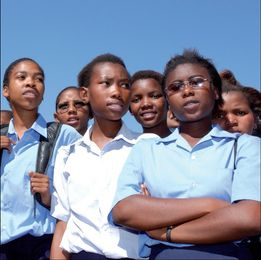 have failed to apply at a college or university on time.
have failed to apply at a college or university on time.
Don’t despair
There is no need to lose hope. If you want to study at the University of South Africa (UNISA), for example, you do not have to apply in advance for most undergraduate courses. You can register up to January. Furthermore, if you failed to get a matric exemption, you will be accepted, but you will have to do an access course over a period of 18 months.
Late registration
At most other universities or colleges you will be given a chance for late application and registration for some courses. However, there are courses that will only accept a limited number of students due to a lack of space. To avoid disappointment, you should contact your college or university of choice as soon as possible to find out about late applications, registration times and dates, and admission requirements for the course you want to study.
FET colleges
If you are not interested in studying at a university, you can register with a college for Further Education and Training (FET). There are about 50 FET colleges all over the country. You can register at FET colleges from October to January. FET colleges offer National Certificate: Vocational (NCV) programmes which give students academic and practical training in many fields.
These include Management, Marketing, Information Technology and Computer Science, Finance, Economics and Accounting, Office Administration, Electrical Infrastructure Construction, Civil Engineering and Building Construction, Engineering and Related Design, Primary Agriculture, Hospitality and Tourism, and Safety in Society.
Bursaries
To help students who cannot afford further studies, bursaries are available from the FET College Bursary Scheme. To apply for a bursary, contact your nearest FET college
To get a FET bursary, you must:
- be a South African citizen
- register or plan to register for a NCV programme at any of the public FET colleges in South Africa
- be in need of financial assistance
-
show potential for academic success
For more on FET colleges, call the Department of Education on 012 312-5580/1, or call 1020. To contact UNISA, call 086 167 0411
- Muzi Mkhwanazi
YOU CAN DISCOVER OUR BEAUTIFUL COUNTRY
YOU CAN DISCOVER OUR BEAUTIFUL COUNTRY sadminSouth Africa has some of the most beautiful and affordable places for tourists to see. They attract thousands of overseas visitors every year. More than five million South Africans wish to travel and have some money to do so, but many do not know where to go or how to plan for a holiday.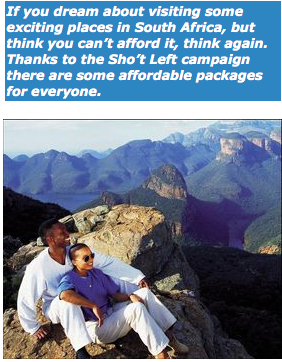
Sho’t Left
SA Tourism, with the help of the Department of Environment Affairs and Tourism, started a plan to help more South Africans take affordable holidays in their own country. The Sho’t Left campaign, which was first started in 2004, gives information and advice about budgeting for a holiday, places to visit, things to do and how to get there.
Affordable
SA Tourism CEO, Moeketsi Mosola, said with the 2007 Sho’t Left campaign they hoped to see more local people travelling in their our beautiful country. While more and more foreign tourists visit our country, South Africans are still not aware of how affordable it is to travel locally, he said. This is why the slogan of the new Sho’t Left campaign, See Your World Differently, challenges everyone to discover their own country even when visiting family and friends,” Mosola said.
There are affordable travel packages in all nine provinces. Here are a just a few examples
- At the Gariep Dam in the Free State, you can stay in a nice room, do sight-seeing, have a picnic or a braai, enjoy water sport, go fishing or swimming. Call 051 430 4596.
- Go to Hartebeespoort Dam in the North West and enjoy a boat ride, wine tasting, drinks and food, visit a strawberry farm and much more. Call 083 540 4000.
- See hyenas, cheetahs, wild dogs, zebras, gemsbok, giraffe and other wild animals at Gauteng’s Lion Park. Call 011 691 9905/6/7/8/9/10.
- Gold Reef City in Gauteng offers rides, restaurants, sight-seeing, underground tours, gold pouring, historical exhibitions and children’s entertainment. Call 011 381 3100.
- Visit Constitution Hill and the Number 4 Prison In Johannesburg where former President Nelson Mandela, Joe Slovo, Mahatma Gandhi and many other political prisoners were held. Call 011 381 3100
- Enjoy the Soweto Tour and see the Hector Peterson Memorial, Mandela Museum, Regina Mundi Church and other interesting places for R350 per person. Call 073 239 3186.
- Visit Port Elizabeth in the Eastern Cape. Enjoy the beautiful beaches, go to the market square and relax in the parks. Call 011 792 1359.
For more on affordable holidays in your province, call the Tourism Helpline: 083 123 6789, or visit the website at www.southafrica.net
- Ndivhuwo Khangale